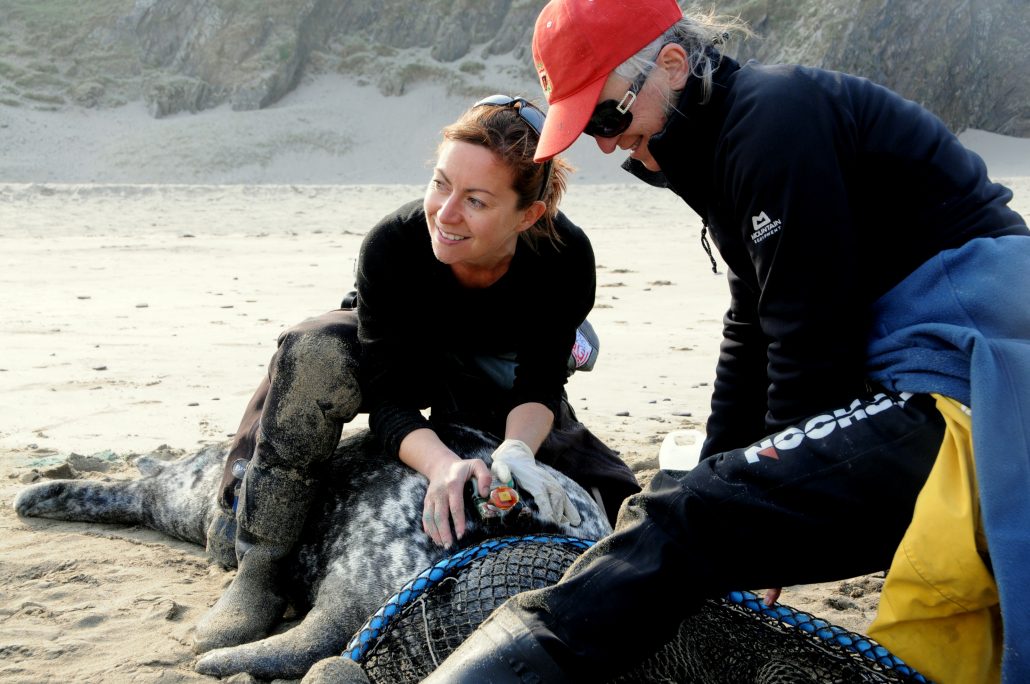
Marine Ecology

The Marine Ecology Group (MEG) conducts fundamental and applied research on key marine species across the food web, from plankton to top predators and contribute scientific knowledge (generating high impact publications & conference presentations) to industry (SEAs, EIAs, industry led research programs) and to policy (advice on risk and mitigation, nationally and at EU level). Marine Ecology Group researchers have internationally recognised and nationally unique expertise in monitoring sensitive marine species, particularly higher predators such as seabirds and marine mammals protected under national and EU conservation legislation (e.g. EU Habitats Directive) and used as indicators of Good Environmental Status under the Marine Strategy Framework Directive.
Core Research Areas Include
- National and regional scale programs on marine mammal distribution and habitat use (Irish continental shelf, Broadhaven Bay)
- Tagging and tracking key species (seals, seabirds, fish, jellyfish) to understand fine scale behaviour and habitat use
- Interactions of top marine predators and human activities (Fisheries, Oil & Gas, Marine Renewable Energy)
- Mitigation against impacts of maritime activities on sensitive marine species
- Science communication, outreach and teaching
Marine Ecology Group were awarded the Research Team of the Year Award in UCC in 2013, for excellence in science which took into account publications in top journals such as Nature and Science. Marine Ecology Group researchers contribute to teaching and learning in UCC, at undergraduate and postgraduate level, developing and delivering modules in Marine Biology and supervising and mentoring students.
Ongoing Projects
- KOSMOS: Identifying and filling gaps in knowledge on cetacean distribution in Irish waters
- Beaufort EAFM: Ecosystems based approach to fisheries management in Irish waters
- ObSERVE: Aerial surveys of marine megafauna in Irish offshore waters
- WESTWAVE: Marine mammal and seabird aerial and acoustic surveys
- RSK: Understanding the impacts of anthropogenic impacts on sensitive marine species in coastal waters
- ASD Pilot: Development of an acoustic deterrent device to mitigate seal fishery interactions
- GENUSWAVE: Startle technology to deter sensitive marine species from anthropogenic activity
- MARINE HARVEST: Interactions between jellyfish and salmon aquaculture
- PIPS: Developing a tool to predict seabird vulnerability to oil pollution
- NPWS: Developing and assessing a monitoring strategy for burrow nesting seabirds
Former Projects
- ESB Sea Bass: Sea bass tagging Cork harbour
- Broadhaven: Marine mammal monitoring program Broadhaven Bay
- EPA NOISE: MSFD research support on descriptor 11 (underwater noise)
- IFI SEAL: Seal salmon interaction study
- BIM SEAL: Seal depredation study
- IRC SEAL: The foraging ecology of the grey seal in Ireland
- BioToMM: Biotelemetry of marine mammals in Irish waters
- FORAGE Seal: The foraging ecology of the harbour seal in Ireland
- GILLPAT: An investigation into gill pathologies in marine reared finfish
- ECOJEL: Managing the opportunities and detrimental impacts of jellyfish in the Irish Sea
- RICORE: Risk based approach to consenting of renewable energy
- KNOWSEAS: Knowledge based sustainable management for Europe’s Seas
- GREY Seal telemetry: Tracking grey seals on the continental shelf
- GREY Seal survey: A feasibility study of using aerial survey techniques to census grey seals during breeding season
- GREY Seal census: Grey seal breeding season surveys
- HARBOUR Seal Census: A national survey of the harbour seal using thermal imagery during the moult season
- CSS: Cetaceans and seabirds at sea
- RAMSSI: Risk assessment for marine mammal and seabird populations in southwest Irish waters
- Tracking Turtles: Tracking ocean giants and their jellyfish prey








